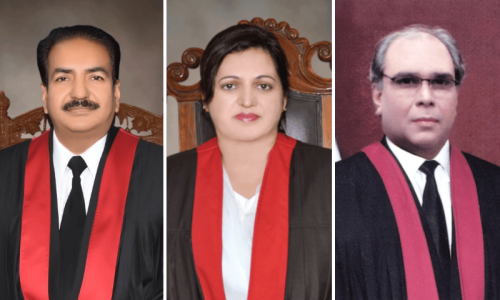
The spectres of ignorance and bigotry are not just haunting Pakistan; they have already cast a dark shadow on the hearts and minds of its people. Those who raised these spectres wished that we all live in an environment of constant fear and mental servitude. A large segment of the elite political class and the dominant institutions of the state have radicalised our society from within.
While we see most of their other schemes fail in local and international arenas, the radicalisation of society and, consequently, the cultivated narrowmindedness of an otherwise normal citizen, are things that have been most successfully undertaken by the powers that be — to the extent that they now themselves feel threatened by their own creation. The potion people were given to consume over the decades was prepared by evenly mixing the majority faith with xenophobic nationalism. This was done by officially encouraging a certain kind of creative literature, imposing conservative and lopsided curricula in educational institutions and relaying public messages promoting orthodoxy through state-controlled media. The potion has worked.
The resolution moved by a section of legislators to ban Lesley Hazelton’s work on Islamic history, or the recent banning of about 100 textbooks by the Punjab Curriculum and Textbook Board (PCTB), is unfortunate, but not surprising. Finally, the passing of the bill in the Punjab Assembly about regulating books and printed material through a bureaucrat, and the sectarian nature of what and what not to write when referring to religious texts and personalities, is also totally understandable. Whether it becomes an act or not, the mere passing of the bill on the Assembly floor is reflective of the nation’s collective state of mind. Upon it being retracted by the government through the provincial governor, many legislators said that they had not properly read the bill before passing it. This is what you call adding insult to injury.
On another front, a single national curriculum is being worked upon. With all their good intentions, the policy makers fall short of realising that a uniform standard of education is something different from a uniform curriculum. Irrespective of their social class, gender, religious denomination and ethnic identity, the state owes all Pakistani children and young people a good standard of education at all levels. This means more investment is needed in building knowledge infrastructure and sharpening teaching skills. The syllabus needs to reflect the variety of experience found in Pakistan and the local realities within which the students exist. Besides, without accepting that Pakistan is a diverse country and realising the need to build an inclusive and plural society, it will be impossible to avoid the chaos that will lead to a complete tattering of the social fabric. And this is likely to happen much sooner than we imagine.
The potion people were given to consume over the decades was prepared by evenly mixing the majority faith with xenophobic nationalism
The prejudices we have encouraged, and the mindset we have created, have resulted in an intolerant and belligerent mass of people who prevail over Pakistani society. Our society has seldom been kind to the best that lived among us. This begins with the court cases filed against the master storyteller Saadat Hasan Manto, blaming him of moral turpitude and obscenity. In the early years of Pakistan, the pain and suffering we inflicted on Manto contributed significantly to the causes of his untimely death. Not only did we put Faiz Ahmed Faiz, the most representative poet of his times, behind bars for several years, the state considered him a traitor for a good part of his life. The revolutionary poet Habib Jalib was made to play hide and seek with police, prisons and courtrooms all his life. The state television aired programmes against Fahmida Riaz, the free spirited and fascinating poet and writer of our times. She, like Jalib, struggled all her life to earn a decent living.
We blackened the tombstone of Dr Abdus Salam, the greatest scientist born on this land. We continue to treat minority faiths and sects with utter contempt. So many around us believe that Gul Makai’s diaries — written during the siege of Swat by extremists and when they were blowing up girls’ schools — were nothing but a hoax. Hence, Malala Yousafzai, a dedicated campaigner for girls’ education, is a ‘foreign agent’ and either she was not shot or the drama was staged by her own family. Ironically, the xenophobic nationalism of her bitter critics fails to remind them that, after being shot, Yousafzai was transported from Swat to a military hospital in Rawalpindi by our own army.
But things are going from bad to worse when it comes to tolerance for that spoken or printed word that people find against their preconceived notions of ideology, morality, history and politics. In the case of Manto, Faiz, Jalib and Riaz, they were bullied by certain powerful segments within the society and state institutions. Their lives were not threatened in their homes or neighbourhoods, work or worship places, bazaars or streets. Now, there is vigilantism and a sense of entitlement among people around us in the name of faith or national interest. You don’t know what will disturb and agitate an individual or a group of people around you who can enact all kinds of harm.
It is already very late, as we have lost a number of generations to ignorance and bigotry. But, if those making decisions have some sense of history, they may still begin to correct the course. Instead of confiscating books, forfeiting literature that they do not agree with and imposing further divisions through educational curricula or public messages in an already fractured polity and society, they should begin to believe in intellectual freedom and critical discourse. If not, they will have more intellectually stunted generations in the future, including their own children and grandchildren.
As the American writer Judy Blume once said, “It’s not just the books under fire now that worry me. It is the books that will never be written. The books that will never be read. And all due to the fear of censorship. As always, young readers will be the real losers.”
The columnist is a poet and essayist based in Islamabad. His latest book is a collection of verse No Fortunes to Tell
Published in Dawn, Books & Authors, August 16th, 2020














































